Toyota President Akio Toyoda Declares: “We Will Lower Japan’s Car Taxes!” — Will This Really Boost Car Purchases?
公開日:2018.08.09

The Problem of High Automobile Taxes in Japan
A while ago, Akio Toyoda, President of Toyota and newly appointed chairman of the Japan Automobile Manufacturers Association, publicly stated that “Japan’s automobile taxes are too high, so I want to reduce all car taxes to the level of kei cars.” This statement was widely shared online.
“I want to align all car taxes with those of kei cars. Kei cars are almost like public transportation in rural areas, so raising their taxes is out of the question. Also, by matching regular car taxes to kei car levels, Japan would finally meet international standards.“
That was the gist of it. Interesting…! For reference, as of August 2018, Japan’s automobile taxes are as follows:
① Private Passenger Cars
[Engine Displacement: Tax Amount]
Up to 1.0L: ¥29,500
Over 1.0L to 1.5L: ¥34,500
Over 1.5L to 2.0L: ¥39,500
Over 2.0L to 2.5L: ¥45,000
Over 2.5L to 3.0L: ¥51,000
Over 3.0L to 3.5L: ¥58,000
Over 3.5L to 4.0L: ¥66,500
Over 4.0L to 4.5L: ¥76,500
Over 4.5L to 6.0L: ¥88,000
Over 6.0L: ¥111,000
② Private Kei Cars
[Engine Displacement: Tax Amount]
Flat rate: ¥10,800
*Source: What are annual automobile and kei car taxes?
Indeed, these taxes are high… Moreover, if these taxes were used for things related to cars, like highway renovations or congestion relief measures, it might be somewhat justifiable, but apparently the actual use of these funds is unclear. Compared internationally, Japan’s car taxes are extremely high.

About 2.4 times higher than the UK, 2.8 times higher than Germany, and 31 times higher than the US…!!
Annual Maintenance Costs Are Quite Significant
Besides automobile tax, owning a car involves other costs such as parking fees, highway tolls, fuel, insurance, and inspection fees. I’ve heard stories of people having to give up their cars because of these costs. Previously, I calculated the actual annual maintenance costs for a Boxster and a Panamera, and was shocked at how expensive it was ((;゚Д゚)).
→[Reference] Calculated the annual maintenance cost of a 981 Boxster GTS — fuel, oil changes, insurance, fuel efficiency, etc.
→[Reference] Calculated the actual annual maintenance cost of the new Panamera Turbo — what was the result?
Given this, it’s very welcome news for current car owners if automobile taxes are lowered.
However… one article said “If the tax burden on cars decreases, the number of users enjoying car life might suddenly increase,” but I wonder if lowering car taxes will really lead to people who don’t currently own cars deciding to buy one?
Four Reasons I Came Up With
While “high car taxes” can be one reason people hesitate to buy cars, I think lowering car taxes alone won’t be enough to significantly increase car purchases. Here are some reasons I thought of:
① Japanese Incomes Are Declining
According to the Ministry of Internal Affairs and Communications’ “Basic Survey on Employment Structure,” the median income of men in their early 40s, the prime working age, has dropped by about ¥500,000 compared to 25 years ago. The median income was ¥5.241 million in 1992 and ¥4.717 million in 2017. This is pre-tax income, so take-home pay is even lower. *Source: Median income of men in early 40s
That said, dual-income households have increased (now over 60% of all households), so household income should be higher, but with mortgage loans, children’s education expenses, and living costs, buying a car that costs several million yen is realistically difficult.
By the way, my family follows the principle of “not buying a home but moving to rental properties that fit our lifestyle at the time.” (Though probably no one cares)
② Japan Has a Well-Developed Rail Network
During a recent trip to the US, I realized how developed Japan’s rail network is. The country’s small size helps, but in urban areas, many subways and JR trains operate, and for long-distance travel across prefectures, the Shinkansen and limited express trains are faster and more convenient than driving.
Also, driving in cities means struggling to find parking, getting stuck in traffic with unpredictable delays, and paying high parking fees. This makes owning a car expensive and inconvenient, reducing its appeal.
③ Japan Lacks a Deep-Rooted Car (Motorsports) Culture
Overseas, there is a strong horse-drawn carriage heritage, and motorsports like F1 are far more popular than in Japan. Races held at circuits attract large crowds and are frequently broadcast on TV, so people have many opportunities to engage with cars and tend to have a positive image of them.
In contrast, Japan’s traditional courier culture and the lingering image of “cars = luxury items” persist. Motorsports rarely feature on sports programs, and opportunities to get close to or experience cars are very limited.
④ Japan Has Few Roads to Fully Enjoy Car Performance
I often think that “Even if I drive a Panamera Turbo on Japanese roads, I can’t fully unleash its performance.” The engine usually runs around 1000 rpm, and I sometimes worry the Panamera might just fall asleep… haha. Speed limits on highways are mostly 80 km/h (some parts might allow 110 km/h), and there are few long straight roads.
Germany has almost the same land area as Japan but has many plains, allowing for high-speed driving on the Autobahn or scenic drives like the Romantic Road. Japan’s mountainous terrain and limited plains mean such roads are rare. So even if you buy a high-performance car, chances to enjoy its driving pleasure nearby are scarce.
…These are just a few reasons off the top of my head, and digging deeper would reveal even more complex issues.
Still, it’s true that “with declining incomes, convenient train transportation, and high car maintenance and tax costs, it’s hard to feel the benefits of owning a car in Japan.” Since cars in Japan are mainly seen as a means of transportation, many feel that kei cars or minivans with ample cargo space are sufficient.
Domestic Automakers Should Also Make Cars That Are Fun to Drive
What’s important for cars to become more popular in Japan? Many motor journalists and car enthusiasts often say that “Japanese automakers should develop cars that are more fun to drive.” That might indeed be true.
On this topic, James May, one of the hosts of the once-popular British car show “Top Gear,” explained “Why modern cars are boring.”
People who don’t like cars plan them,
People who don’t like cars design them,
People who don’t like cars develop them,
People who don’t like cars test them,
People who don’t like cars manufacture them,
People who don’t like cars inspect them,
People who don’t like cars sell them.
Makes sense. This might very well apply to Japan today.
Structural Issues in Japan
Ideally… though it will never happen, “if buying a car exempted you from income tax, or if you could buy a car using hometown tax donations (I think something like this existed… but maybe it was illegal),” such tax incentives might increase car purchases (laughs). But that’s absolutely unlikely.
Japan’s tax system means the more you earn, the higher your income tax rate, so you end up paying more taxes.
Also unrelated to cars, although Japan talks about countering the declining birthrate, “working hard in dual-income households and having more children means paying huge daycare fees.”
A working mother I know has three children, and because she and her husband both earn well, their authorized daycare fees are at the maximum level (daycare fees are linked to income tax). Putting three kids in daycare costs about ¥300,000 per month, so
“Working hard means less time with my children, and much of my earnings go to daycare fees… I sometimes wonder why I’m working at all and if it might be better to be a full-time housewife,” she once said.
I’ve gone off-topic, but I think it’s great that a car enthusiast like President Toyoda is leading the industry and pushing reforms. President Toyoda, please keep up the great work for the development of Japan’s car culture!ヽ(゚д゚)ノ
このブログが気に入ったらフォローしてね!


Comment ( 0 )
Trackbacks are closed.
No comments yet.